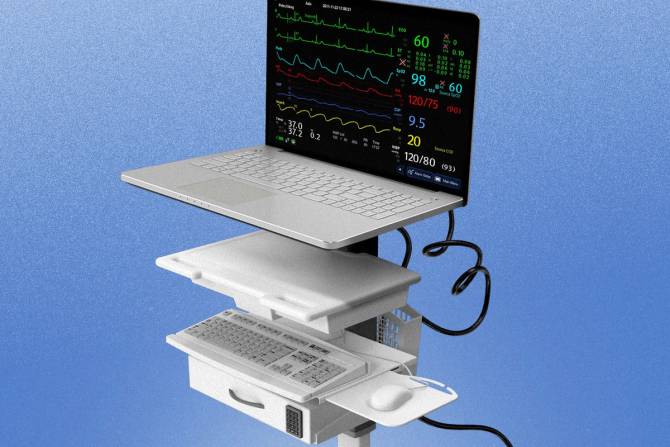Happy Wednesday! We’re a week into March Madness, so if you’re one of the almost 68 million people projected to place bets, we hope you’re making bank (or haven’t lost too much yet). In the spirit of basketball and healthcare, here’s a fun fact from the Mayo Clinic: Playing basketball can improve bone density and lower risk of mortality from cardiometabolic diseases.
In today’s edition:
 Digital transformation Digital transformation
 Rural hospitals Rural hospitals
 Childhood obesity Childhood obesity
—Shannon Young, Kristine White, Jamie Wilde
|
|
Amelia Kinsinger
Move over “value-based care.” Digital transformation—the adoption of technology to improve efficiency and outcomes—is the latest trend taking over US healthcare.
Health systems are increasingly adopting new software, digital tools, and strategies that aim to modernize everything from how patients book appointments to how facilities order and manage medical supplies while also improving outcomes and lowering costs.
The move toward more efficient 21st-century solutions may seem like a natural progression for an industry that relies heavily on technology and patient outcomes. But hospital executives overseeing these efforts (and the consultants they work with) argue that digital transformation is more than just digital portals and virtual appointments.
“It’s really finding the right balance of people and skills, and technology—whether that be applications and infrastructure—and data to really exceed the customer’s expectations and [...] enhance the business operations margins,” Glenn Landmesser, VP of digital transformation at RiseNow, a supply chain management consultancy firm, told Healthcare Brew.
Digital transformation explained. Digital transformation is not an entirely new concept in healthcare. Hospitals and health systems have slowly adopted new technology over the last decade to improve clinical (i.e., patient-facing) and administrative systems (think: finance, supply chain, and data management).
But that shift accelerated in recent years, as the Covid-19 pandemic forced health systems to embrace telehealth and sparked supply chain, workforce, and capacity challenges.
Landmesser, who consults with healthcare organizations, said it’s “critical right now that hospital organizations digitally transform their organizations” on both the clinical and administrative sides.
“That’s the only way they’re going to continue to put themselves in a more favorable operating position—and a competitive position,” he said.
Spending on digital transformation is projected to hit $3.4 trillion globally in 2026, according to a 2022 International Data Corporation analysis.
Keep reading here.—SY
Do you work in healthcare or have information about the industry that we should know? Email Shannon at [email protected]. For completely confidential conversations, ask Shannon for her number on Signal.
|
|
|
Tired of scrolling through endless articles in search of the latest business news? Look no further than Morning Brew’s free daily newsletter. Whether you’re a seasoned professional, a budding investor, or simply someone who wants to stay up to date on the business and finance world, Morning Brew has you covered. Its writers sift through the noise to bring you the stories that matter most to your bottom line in one concise, quick-to-read email every day of the week.
Join 4m+ people who start their day with the Brew and discover why it’s the ultimate source of business news. Sign up now so you don’t miss a beat.
|
|
Diane Labombarbe/Getty Images
A new Medicare designation may save the most vulnerable rural hospitals from closing.
The Rural Emergency Hospital (REH) designation, which took effect in January, awards participating hospitals with an additional 5% reimbursement for Medicare outpatient care payments and a monthly facility payment. The Centers for Medicare and Medicaid Services (CMS) will pay participating hospitals more than $3 million a year through the new designation, according to a 2023 report from healthcare advisory firm Chartis.
The funding might help a facility retain their emergency departments, outpatient care, and clinics at a time when rural hospitals are facing existential crises.
The number of rural hospital closures is expected to rise as Covid-19 relief funds dry up, according to the report.
More than 40% of all US rural hospitals and 51% of those in states without Medicaid expansion are operating in the red, per the report. In 2020, there were 453 rural hospitals that were vulnerable to closure, Chartis found.
“For some hospitals, our data model suggests the REH designation will serve as a desperately needed relief valve to avoid closing and provide a significant reversal in fortune for the vulnerable communities they serve,” Michael Topchik, national leader of the Chartis Center for Rural Health, said in a statement. “But the decision to convert is highly nuanced, and as a result, we expect to see a relatively small number of hospitals embrace REH.”
Only 77 of the approximately 1,600 REH-eligible hospitals are ideal candidates for the conversion. These hospitals are smaller in revenue size, reported YoY negative operating margins, and lower average inpatient numbers, per the Chartis report.
Keep reading here.—KW
Do you work in healthcare or have information about the industry that we should know? Email Kristine at [email protected]. For completely confidential conversations, ask Kristine for her number on Signal.
|
|
Alyssa Nassner
Little discs of cardboardy dough smothered with unnervingly sweet pizza sauce via a tiny red stick, sprinkled with what is called “cheese”: Lunchables’s Extra Cheesy Pizza—as well as its Turkey and Cheese variety—will be on the menu at K-8 cafeterias across the US come fall as part of Kraft Heinz’s new deal with the National School Lunch Program (NSLP). NSLP provides free or low-cost lunches to nearly 30 million children.
’90s kids may already be salivating, but they should know that Kraft Heinz had to tweak its original recipes to hit some nutritional targets required for school meals—such as lower levels of fat and sodium and increased amounts of protein and whole grains.
Child nutrition experts aren’t satisfied with the new formulations. They argue that the reengineered Lunchables are a red flag that the US’s standards for school lunches are simply too low…and that they may be that way in part because schools are too underfunded to raise them.
- K-12 cafeteria budgets have been tightened by high food costs, supply chain snags, and labor shortages.
- One of the main selling points of Lunchables to the NSLP was that they’re refrigerated, not frozen, which costs less to ship and store.
“School nutrition programs need to be reimbursed at a rate that they can scratch-cook delicious, healthy meals and not just provide the students a Lunchable because they don’t have equipment or labor,” Donna Martin, the director of a school nutrition program, told the Washington Post.
Others are concerned that selling a healthier version in schools than in stores could confuse customers into thinking the for-school versions and the grocery originals are equally healthy. But Kellogg’s Pop-Tarts, General Mills cereals, and even Domino’s pizza already have healthified versions available at school cafeterias.
Speaking of marketing…getting in front of Gen Alpha (yeah, that’s what comes after Gen Z) is a Super Bowl-level win for Kraft Heinz. Lunchables accounted for 8.6% of the grocery-dominating food company’s sales last year, and this could boost sales even higher.—JW
|
|
Francis Scialabba
Today’s top healthcare reads.
Stat: A county in Georgia spent over $1 million to avoid paying for an employee’s gender-affirming care. (ProPublica)
Quote: “Most hospitals around the country are over Covid. We’ve proven ourselves. Why aren’t we moving on?”—James Fiorica, Sarasota Memorial Hospital’s chief medical officer, on criticism from right-wing groups on alleged “egregious recklessness” relating to Covid-19 treatment protocols (the New York Times)
Read: Walgreens is the latest company to become entangled in “the corporate culture wars.” (the New York Times)
Time well spent: Demand for healthcare is rising, and patients and providers are feeling the pinch. WellSpan Health physicians using Nuance’s DAX improved the patient experience and saw 9 more patients per month. Get the full report.*
Penny for your thoughts: Or a chance to win a $250 AmEx gift card, perhaps? Take our quick li’l survey on what you want to see in Healthcare Brew and help us make content you’ll love.*
*This is sponsored advertising content.
|
|
-
Medical professionals and other healthcare experts agree: There’s no consensus on the best ways to treat childhood obesity.
-
A new law could help mobile clinics improve rural access to dental and healthcare services.
-
Californians will head to the polls to decide if the state will expand access to psych beds under a new proposal from Gov. Gavin Newsom.
-
A new proposal could remove many “forever chemicals” from tap water.
|
|
Catch up on the top Healthcare Brew stories you may have missed:
|
|
|
Written by
Shannon Young, Kristine White, and Jamie Wilde
Was this email forwarded to you? Sign up
here.
{if !contains(profile.lists,"Marketing Brew") || !contains(profile.lists,"CFO Brew") || !contains(profile.lists,"HR Brew") || !contains(profile.lists,"EmTech Brew") || !contains(profile.lists,"IT Brew") || !contains(profile.lists,"Retail Brew") || !contains(profile.lists,"Healthcare Brew")}
Take The Brew to work
{/if}
{if !contains(profile.lists,"Marketing Brew")}
-
Marketers:
{if !contains(profile.lists,"Marketing Brew")}
Marketing Brew
{/if}
{/if}
{if !contains(profile.lists,"CFO Brew") || !contains(profile.lists,"HR Brew")}
-
Corporate:
{if !contains(profile.lists,"CFO Brew")}
CFO Brew
{/if}
{if !contains(profile.lists,"HR Brew")}
HR Brew
{/if}
{/if}
{if !contains(profile.lists,"EmTech Brew") || !contains(profile.lists,"IT Brew")}
-
Tech:
{if !contains(profile.lists,"IT Brew")}
IT Brew
{/if}
{if !contains(profile.lists,"EmTech Brew")}
Tech Brew
{/if}
{/if}
{if !contains(profile.lists,"Retail Brew")}
-
Retailers:
Retail Brew
{/if}
{if !contains(profile.lists,"Healthcare Brew")}
-
Healthcare:
Healthcare Brew
{/if}
{if !contains(profile.lists,"Daily Business") || !contains(profile.lists,"Money Scoop") || !contains(profile.lists,"Money With Katie")}
Get smarter in just 5 minutes
{/if}
{if !contains(profile.lists,"Daily Business")}
-
Business News:
Morning Brew
{/if}
{if !contains(profile.lists,"Money Scoop") || !contains(profile.lists,"Money With Katie") || !contains(profile.lists,"Raise")}
-
Money & Career:
{if !contains(profile.lists,"Money Scoop")}
Money Scoop
{/if}
{if !contains(profile.lists,"Money With Katie")}
Money With Katie
{/if}
{if !contains(profile.lists,"Raise")}
Raise
{/if}
{/if}
Business education without the BS
Interested in podcasts?
|
ADVERTISE
//
CAREERS
//
SHOP
//
FAQ
Update your email preferences or unsubscribe
here.
View our privacy policy
here.
Copyright ©
2023
Morning Brew. All rights reserved.
22 W 19th St, 4th Floor, New York, NY 10011
|
|







